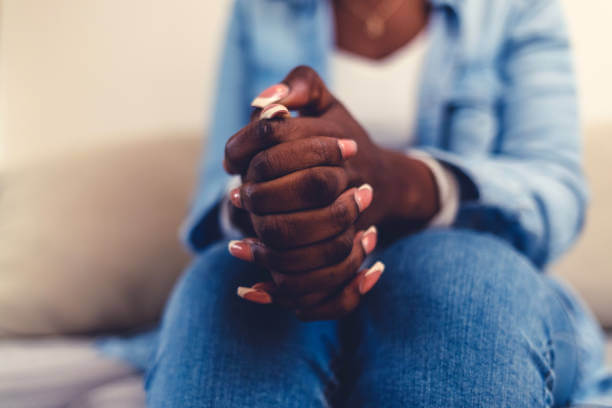“I need to identify her body at the hospital,” Father said, his grip on the car key betraying his unease.
It seemed as though he was avoiding meeting Mother’s gaze. It was the day after the news of Amara’s death had reached our home. I wanted to accompany Father, but Mother had not uttered a word since yesterday. Her calmness was striking, given that she had returned home the previous day in the company of mourners, wailing. Instinctively, I moved to Mother’s side where she sat closest to the door leading to the front yard. She held me by my side and pulled me closer, enveloping me in her embrace. I caught a whiff of her sweet candy-scented perfume – it was reminiscent of actual candy. Amara often raided Mother’s wardrobe, taking anything from her newly purchased shoes to her perfumes. Coincidentally, the sweet candy perfume was Amara’s favourite. She would claim it was superior to any other scent she had ever worn. Even Sandra, who possessed an uncanny ability to identify any perfume by its scent alone, struggled to pinpoint the type Amara used. Amara had a natural inclination for mischief. She often encouraged me to maintain my status as the “golden child,” shirking the weighty responsibilities that came with maintaining a perfect academic record. “Imagine not seeing the puzzled expression on Father’s face when he receives my grades, the uncertainty. I fear that maybe I’ll have to retake a course. That would be your job. And being the responsible one is your thing, so keep up the perfect result,” she would say with a smile that was always tinged with a hint of falseness. I wondered if Amara would shed tears if I were to go missing.
“I’ll be here until you return,” Mother replied, giving me a gentle nudge. I looked up at her, and beneath her eyes, I detected a mix of concern and uncertainty. Her vocal cords had been strained from her outbursts the previous day.
“I’ll stay with Nelo,” she said. I managed to smile at her, but she quickly averted her gaze. “That would be fine.” Father tightened his belt around his waist. “Chinelo, make sure you take good care of your mother. There’s egusi in the fridge. Prepare some eba so your mother can have something to eat.”
Father returned shortly with the chilling details of Amara’s death. Evidently, she had been brutally murdered, along with another young woman. What made Amara’s death particularly distressing was the fact that she had been stabbed 52 times and left naked. There was no evidence of sexual assault. The police speculated it might be a gang-related ritual or a vengeful act by a former lover. Amara’s lifeless body was found in a hotel room, accompanied by a note that read, “Stay in school.” Perhaps it was the work of a serial killer targeting young female students who weren’t committed to their studies.
Less than a week passed before news of Amara’s tragic death and its gruesome details spread across the campus like wildfire. No one could hear about her death without feeling a sense of sorrow. Soon, student activists organized mass protests throughout the campus, demanding justice for Amara. Placards proclaiming “Justice for Amara” became ubiquitous, trending on social media platforms like Twitter and Facebook. Online or offline, it was impossible to escape the discourse surrounding Amara’s case. Walking a few blocks from home meant encountering sympathetic faces, all eager to discuss the tragedy. One sympathizer approached me, offering condolences for my sister’s death and hoping to gain insights beyond what was publicly known. When I couldn’t provide any additional information, she bluntly questioned why Amara had been in a hotel room. The query was offensive, and it shed light on Mother’s desire to abandon the case.
Amara’s death seemed to unveil facets of her identity that had remained hidden. On a cold morning, I stumbled upon a social media post praising Amara’s intelligence and unwavering dedication to her studies. The post had been shared by one of her lecturers on Facebook. The revelation of Amara’s 4.62 grade point average shocked us all. Reading the comments from strangers mourning the loss of a potential Albert Einstein, envisioning her as a brilliant mind with the potential to become the first female Nigerian president, was a revelation. Father’s disbelief prompted him to request a look at her academic records, confirming the truth. I pondered over Amara’s reasons for downplaying her exceptional qualities.
With media pressure mounting, the police felt compelled to take the investigation more seriously. It evolved into a complex case under the scrutiny of the media. People were anxiously awaiting the outcome. Father, fueled by Amara’s tragedy, turned into a human rights activist almost overnight. He participated in media interviews, articulating his stance on radio stations. He lent his voice to the call for justice on various platforms. I tuned in to the radio station each morning at 7:30, eager to hear Father’s charismatic voice. The back-and-forth media engagements wore on Mother’s nerves, who was solely focused on finding closure.
The CWO (Catholic Women’s Organization) leader frequently visited our house, offering comfort and food. She would inquire, “Chinelo nwa, how are you? Is there something you’d like to eat?” My reply was always a polite refusal. Mother once confessed her aversion to attending church because Father Matthew would mention Amara’s name, praying for her to find justice. “Was God asleep when she was stabbed, one, two, then fifty-two times?” she’d ask me. I wanted to assure her that God knew best, but the idea of what was best in allowing Amara to meet such a fate eluded me.
“The last time I went to the market, I noticed the way those women looked at me. Mama Ebuka even gave me smoked fish for free. That stingy woman who wouldn’t even spare Ten Naira for you. Is this what grief brings? Or is it because Amara’s death was so tragic?” Mother turned her gaze to me. “Nelo, your sister was stripped naked. Ah!” Her wail carried a heavy burden. I had no answers to her questions. I sensed that she didn’t expect me to provide any. My role was to offer solace.
Just when Mother was at her breaking point, Uncle Stephen called Father with news of a suspect in custody, ready for questioning. Father immediately requested permission to interrogate her, although it was against protocol. Uncle Stephen advocated on his behalf, and Father was granted entry to the station.
The 15-minute drive to the station felt interminable. We drove in silence. This was the same route we took on our way to the village, a journey that typically had Father bemoaning the bad road and the dubious contractors who thrived in collusion with the ruling government.
“They exacerbate the plight of ordinary citizens, all to bolster their campaign agenda for the upcoming election.” He would say.
Mother was visibly restless throughout the drive, emitting the occasional sigh. The first time she did so, both Father and I exchanged glances.
Read the next part here: COLD FIRE: Part 3


